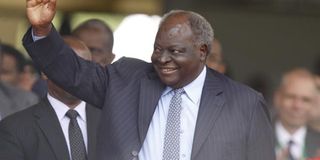Mwai Kibaki in contention for Mo Ibrahim prize

Former President Mwai Kibaki during the Kenya at 50 celebrations in 2013. FILE PHOTO | MARTIN MUKANGU |
What you need to know:
- Honour recognises a retired African president who has shown exemplary leadership.
- In spite of the post-election violence and rigging claims, former president is credited with reviving the economy.
Retired president Mwai Kibaki is among the top three contenders for the prestigious Mo Ibrahim Prize for Achievement in African Leadership which is awarded to former democratically elected presidents who demonstrated excellence during their time in office.
This comes barely a year after critics dismissed his candidacy for the award because of the 2008 post-election violence and opposition claims that his election to a second term had been rigged.
The award, which comes with a $5 million cash reward spread over 10 years — the largest annually awarded in the world — is set to be presented in Nairobi on March 2 further fuelling speculation about the chances of Mr Kibaki winning it.
PRIZE MONEY
Additionally, the winner will receive $200,000 annually for life after the end of the 10 years.
To be considered, the former president must have been democratically elected and have left office within the last three years after serving their constitutionally mandated term.
They must have demonstrated exceptional leadership by rising above constraints to develop their countries, lifting people out of poverty, and paving the way for future prosperity.
Others being considered are former Mozambique president Armado Guebuzza and Hifikepunye Pohamba of Namibia who both left office last year after completing their terms.
Four other African presidents have left office within the last three years but have not been considered because of the manner in which they left office or how they got into office.
Abdoulaye Wade, Senegal’s former president who just recently returned from self-exile, was beaten in his quest for a controversial third term by Macky Sall in 2012 in an exercise that was marred by violent protests.
Self-exiled Amadou Toumani, who was president of Mali from 2002 to 2012, was ousted in a military coup just before his second term ended.
And even though Shariff Shekh Mohamed of Somalia (2009-2012) and Moncef Marzouki of Tunisia (2011-2014) both served as presidents of their respective countries they were not elected through universal suffrage.
All three contenders for this year’s award have a sizeable portfolio of achievements made during their time in office.
Guebuzza, who last year pulled a surprise when he returned a luxury Mercedes Benz car offered to him as a gift by a business association, is hailed for fighting corruption during his reign.
During his time in office a number of ministers and public officials who engaged in corruption were jailed.
Over the last few years, Mozambique has also experienced an economic growth rate in excess of seven per cent, with notable improvements in agriculture, manufacturing, industry, trade and transport sectors.
Pohamba inherited a rather stagnant Namibian economy slowed down by the HIV/Aids pandemic and over-reliance on the South African economy when he took office in 2005.
ECONOMIC GROWTH
By the time he left office, the economy was growing at four per cent per annum courtesy of a diversified mining economy. Today, the country is one of the world’s largest producers of uranium.
But analysts are placing their bets on Kibaki, a career economist credited with turning around the economy of Kenya that had taken a beating in the Moi era.
The economy experienced a major turnaround from 0.6 per cent growth when he took office to seven per cent before the 2007 General Election when it declined to 1.7 per cent in post-election violence before picking up again to six per cent by the time he left office.
Among other things, his administration is credited with introduction of the Constituency Development Fund (CDF), free primary education, a new constitution, democratic and judicial reforms, and massive infrastructure development.
“The panel is likely to emphasise how the economies of all the contenders performed when they were in office and, if that will be the main criteria, then Kibaki has a real chance,” says Prof Winnie Mitula of the University of Nairobi.
“All the contenders are possible winners, but if you look at how Kenya managed to move from the path of economic ruin in 2002 and then again after the post-election violence… means he deserves the award,” she says.
Prof Mitula argues that although the post-election violence may affect Kibaki’s chances, the selection panel will find it difficult to overlook his other achievements.
“The fact that as a country we were able to move out of that situation is what will matter most, Most African countries that get in such situations never come out.”
Previous winners of the award created by Sudanese billionaire Mo Ibrahim are Pedro De Verona (Cape Verde) in 2011, Festus Gontebanye Mogae (Botswana) in 2008, Joaquim Chissano (Mozambique) in 2007 and Nelson Mandela who received an honorary prize.
No award was given in 2009, 2012, or 2014.





